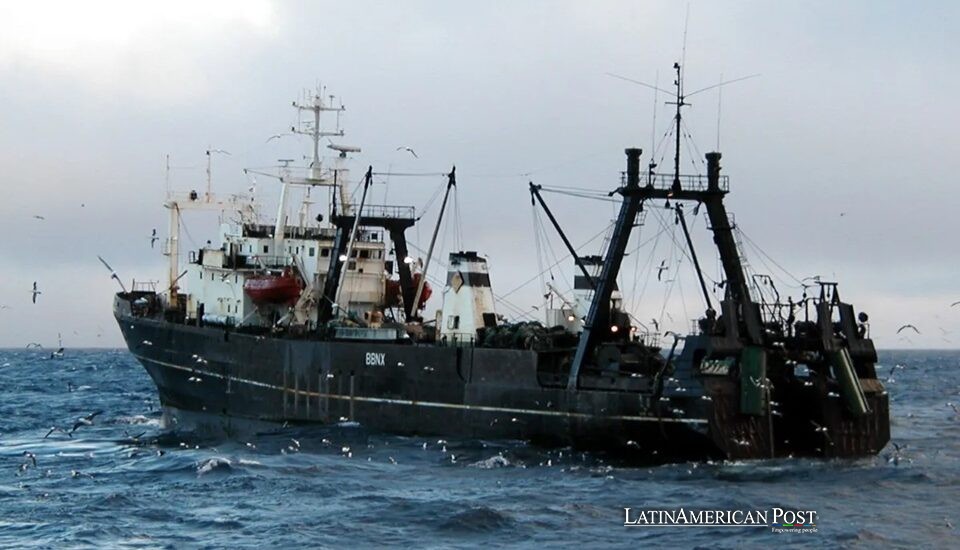Chile’s Fishing Law Clashes: Latin American Wake-Up Call

Police clashed violently with protesters outside Chile’s national Congress, shining a spotlight on deep tensions between artisanal and industrial fishers. As debates over a new fishing law stall, many wonder if these events present broader resource conflicts across Latin America.
A Conflict Erupts in Valparaiso
Tensions ran high before Chile’s national Congress in Valparaiso on Tuesday, as protesters clashed with riot police following a key Senate commission’s decision to delay voting on a controversial fishing law. According to Reuters footage, armored police vehicles deployed water cannons against demonstrators carrying the Chilean flag while thick clouds of tear gas filled the streets. At least one police officer was injured, and several protesters were detained after crowds attempted to breach a gate encircling the legislative building.
The proposed law seeks to redistribute fishing quotas between artisanal and industrial sectors, a hot-button issue that has ignited longstanding disputes in Chile’s coastal communities. Fishermen argue that the industrial fishing industry, often dominated by large corporations, has unfairly cornered most of the country’s resources. Although artisanal fishers temporarily won favorable percentages—such as 70% for hake and 90% for cuttlefish—while the bill was in the lower house, those allocations have shrunk in the Senate, sparking anger and protest.
Union leader Hugo Poblete, representing fishers in Quintero in central Chile, observed the commission’s debate on a large screen outside Congress. Speaking to Reuters, Poblete explained that artisanal fishers felt the legislative process was slipping away. “The point being debated now is the fractioning or percentages each sector gets from different species,” Poblete said. Police acted soon after the Senate committee chose to delay the vote, which raised anger among fishermen who see the process as taken over by strong industrial powers.
Harsh scenes outside Chile’s legislative halls drew notice across Latin America, where battles over natural resources often spark social and economic shocks. Chilean officials used tear gas water cannons in a space set aside for public talk. They clarified the serious, brutal conflict over resource rights – several nearby nations face this problem.
Implications for Latin America’s Coastal Communities
Chile’s dispute about fishing limits is hardly unique. Coastal groups in Latin America depend on local fishing for their work. The fishers face pressure from big boats with ample money plus political support. Governments try to split two aims: protect weak sea life while giving a fair share of resources. Yet the loud protests in Valparaiso prove that reaching both aims is hard.
For many Latin American nations, artisanal fishing serves not merely as a tradition but as a critical economic engine. It supports entire local supply chains that include gear suppliers, transport services, and seafood markets. “It’s not just the fishers, it’s all the people related to the sea,” said artisanal fisher Susana Olea, 55, to Reuters. Olea, who has been fishing since childhood in the southern town of Lebu, emphasized how one boat can sustain multiple jobs—from bait preparation to loading crews. “We’re preparing less bait these days. There’s no Brama fish anymore,” she said, highlighting the scarcity created by what small fishers see as an encroachment by large-scale operators.
Conflicts over resources among small-scale and large-scale fishers also involve nature matters. Local fishers use safe methods that clash with the harsher techniques of larger fleets, which may reduce essential fish stocks. If Chile changes its law to give more fishing share to big companies, critics worry that marine life will drop faster. That result may affect nearby areas as fish cross borders while nature loses balance.
Latin America’s actions to fix these issues differ. Some nations, such as Peru and Ecuador, try to control fishing with clear rules. Others find it hard to make fishing limits work or stop illegal catches. Yet the key question is: How do governments fairly share sea resources to meet growth needs and nature care?
Democracy, Dissent, and the Road Ahead
The fight in Valparaiso shows a deep worry in Chilean society that touches many Latin American nations. When lawmakers delay votes or laws seem to serve large firms, trust fades among the people. The events near Congress show how quickly tensions increase. Protesters tried to enter the legislative area. This act reveals the fear of communities that believe their old work is in danger.
Chile’s largest industrial fishing companies, gathered in Sonapesca, did not speak about the protests. This fact raises doubts about hidden agreements or wrong influence on decisions. Small-scale fishers vow to continue their work—they state that their traditions have almost disappeared. According to Olea and other fishers interviewed by Reuters, cuttlefish quotas are a matter of existential importance, especially if species are declared 100% reserved for artisanal use—something small-scale operators see as their last hope for survival.
Though the vote remains delayed, the Senate can introduce amendments or postpone decisions indefinitely, exposing the proposed law to further legislative hurdles. These doubts caused fishers to schedule extra protests, which may raise problems in the coming weeks. Fights between riot police and Chilean people may grow more common if a fair solution does not occur.
For the whole region, the dispute in Chile raises pressing issues about government, resource handling, and social inclusion. Countries with similar disputes might examine Valparaiso’s issues as an alert: leaving out small groups may cause problems, damage local trade, or burden public services. Sharing resources reasonably may require a pact between small groups and industrial ones—a job that is not easy.
Also Read: Latin America’s Most Groundbreaking Companies for 2025
With legislative debates set to resume and fishers pledging ongoing demonstrations, the resolution of Chile’s fishing quota battle is far from certain. Nonetheless, the events in Valparaiso offer a window into the region’s broader struggle with equitable resource distribution. Suppose Latin America hopes to avoid further escalation. In that case, it may be time for policymakers and civil society to seek balanced approaches that recognize small-scale fishers’ importance to cultural heritage, food security, and ecological stability. Only then can the region chart a path reconciling economic development with environmental stewardship, ensuring that conflicts like Tuesday’s clashes become the exception rather than the norm.





